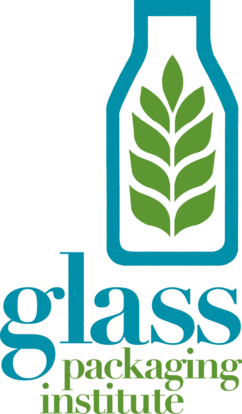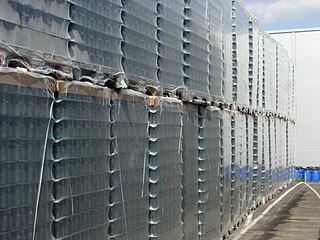
A reusable bottle is a bottle that can be reused, as in the case as by the original bottler or by end-use consumers. Reusable bottles have grown in popularity by consumers for both environmental and health safety reasons. Reusable bottles are one example of reusable packaging.

Owens Corning is an American company that develops and produces insulation, roofing, and fiberglass composites and related materials and products. It is the world's largest manufacturer of fiberglass composites. It was formed in 1935 as a partnership between two major American glassworks, Corning Glass Works and Owens-Illinois. The company employs approximately 19,000 people around the world. Owens Corning has been a Fortune 500 company every year since the list was created in 1955. The Pink Panther acts as the company's mascot and appears in most of their advertisements.

Compagnie de Saint-Gobain S.A. is a French multinational corporation, founded in 1665 in Paris and headquartered on the outskirts of Paris, at La Défense and in Courbevoie. Originally a mirror manufacturer, it now also produces a variety of construction, high-performance, and other materials.

O-I Glass, Inc. is an American company that specializes in container glass products. It is one of the world's leading manufacturers of packaging products, holding the position of largest manufacturer of glass containers in North America, South America, Asia-Pacific and Europe. Approximately one of every two glass containers made worldwide is made by O-I, its affiliates, or its licensees.

A Mason jar, also known as a canning jar or fruit jar, is a glass jar used in home canning to preserve food. It was named after American tinsmith John Landis Mason, who patented it in 1858. The jar's mouth has a screw thread on its outer perimeter to accept a metal ring or "band". The band, when screwed down, presses a separate stamped steel disc-shaped lid against the jar's rim.

Ball Corporation is an American company headquartered in Broomfield, Colorado. It is best known for its early production of glass jars, lids, and related products used for home canning. Since its founding in Buffalo, New York, in 1880, when it was known as the Wooden Jacket Can Company, the Ball company has expanded and diversified into other business ventures, including aerospace technology. It eventually became the world's largest manufacturer of recyclable metal beverage and food containers.

Glass milk bottles are glass bottles used for milk. They are generally reusable and returnable - used mainly for doorstep delivery of fresh milk by milkmen as retail store sale is available in certain regions of the United Kingdom. Once customers have finished the milk, empty bottles are expected to be rinsed and left on the doorstep for collection, or rinsed bottles may be returned to a participating retail store. Bottle sizes vary depending on region but common sizes include: pint, quart, litre, etc.
RockTenn was an American paper and packaging manufacturer based in Norcross, Georgia. In 2015, it merged with MeadWestvaco to form the WestRock company.

A glass bottle is a bottle made from glass. Glass bottles can vary in size considerably, but are most commonly found in sizes ranging between about 200 millilitres and 1.5 litres. Common uses for glass bottles include food condiments, soda, liquor, cosmetics, pickling and preservatives; they are occasionally also notably used for the informal distribution of notes. These types of bottles are utilitarian and serve a purpose in commercial industries.

Glass recycling is the processing of waste glass into usable products. Glass that is crushed or imploded and ready to be remelted is called cullet. There are two types of cullet: internal and external. Internal cullet is composed of defective products detected and rejected by a quality control process during the industrial process of glass manufacturing, transition phases of product changes and production offcuts. External cullet is waste glass that has been collected or reprocessed with the purpose of recycling. External cullet is classified as waste. The word "cullet", when used in the context of end-of-waste, will always refer to external cullet.

The Glass Packaging Institute (GPI) is the North American trade association for the glass container industry, headquartered in Arlington, Virginia. Through GPI, glass container manufacturers advocate job preservation and industry standards, and promote sound energy, environmental, and recycling policies.

The Whitall Tatum Company or Whitall Tatum (1806–1938) was one of the first glass factories in the United States.

An aluminum bottle is a bottle made of aluminum. In some countries, it is also referred to as a bottlecan. It is a bottle made entirely of aluminium that holds beer, soft drinks, wine, and other liquids.

Glass production involves two main methods – the float glass process that produces sheet glass, and glassblowing that produces bottles and other containers. It has been done in a variety of ways during the history of glass.

Ardagh Group is a Luxembourg-based producer of glass and metal products that has "grown in the past two decades into one of the world’s largest metal and glass packaging companies".
The Ontario Deposit Return Program (ODRP), also simply known as Bag it Back, is a regulation of the province of Ontario, Canada. Its purpose is to divert recyclable materials from landfill or low-quality recycling uses by charging a fee for each alcoholic beverage container sold in the province, and processing the material for re-use or other recycling activities once the containers are returned for a refund of the deposit fee. Customers forfeit the deposit fee if the container is not returned.
Bottles are able to be recycled and this is generally a positive option. Bottles are collected via kerbside collection or returned using a bottle deposit system. Currently just over half of plastic bottles are recycled globally. About 1 million plastic bottles are bought around the world every minute and only about 50% are recycled.
Reusable packaging is manufactured of durable materials and is specifically designed for multiple trips and extended life. A reusable package or container is “designed for reuse without impairment of its protective function.” The term returnable is sometimes used interchangeably but it can also include returning packages or components for other than reuse: recycling, disposal, incineration, etc. Typically, the materials used to make returnable packaging include steel, wood, polypropylene sheets or other plastic materials.

Saint-Gobain SEFPRO, founded in 1929, produces refractories for the glass industry. The company consists of plants, sales offices and Research and Development Centers employing over 2200 people across four continents, with headquarters in Le Pontet, Vaucluse, France. The group belongs to the ‘Innovative Materials’ division of the Saint-Gobain group.
Celotex Corporation is a defunct American manufacturer of insulation and construction materials. It was the subject of a number of high-profile lawsuits over products containing asbestos in the 1980s, eventually declaring Chapter 11 bankruptcy in 1990.














